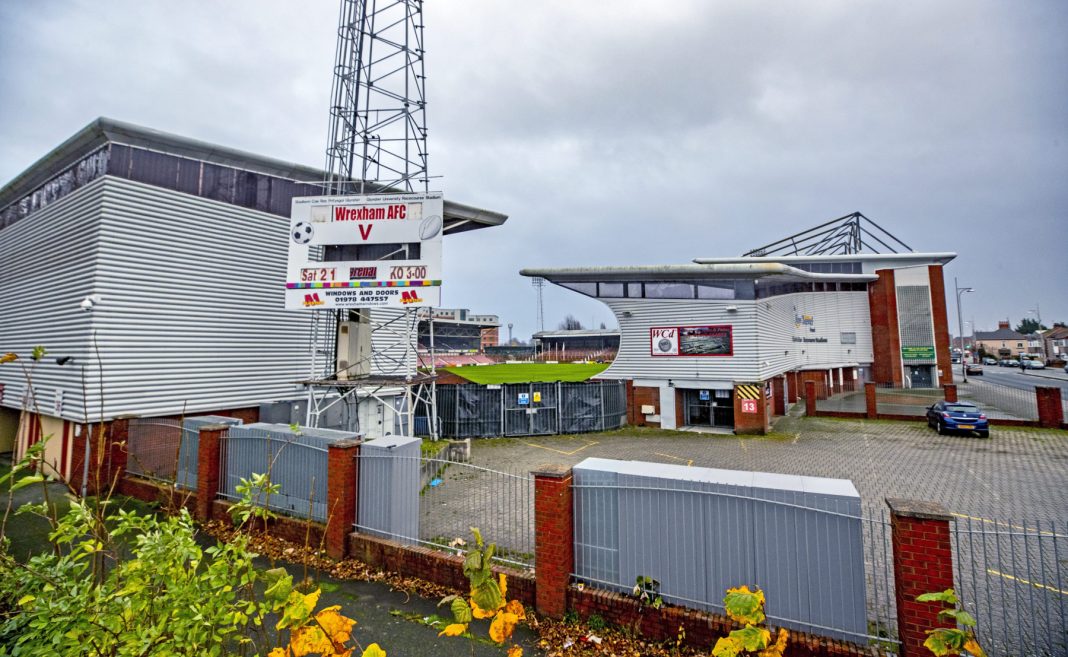 National League club Wrexham AFC took the footballing world by surprise when it announced that Hollywood duo Ryan Reynolds and Rob McElhenney had placed a bid to buy into the non-league side.
National League club Wrexham AFC took the footballing world by surprise when it announced that Hollywood duo Ryan Reynolds and Rob McElhenney had placed a bid to buy into the non-league side.
Spencer Harris, Current Director of the club, told Insider Sport about how the club plans to engage a new demographic through its takeover and discusses rumours of a potential Netflix docu-series to draw in supporters.
IS: A lot of supporters, not just of Wrexham, were somewhat surprised that two such individuals were interested in buying the club. Did you reciprocate that?
SH: It didn’t take me by surprise at all that there would be people out there wanting to invest in a well-run football club that is debt free, very well set up and got lots of capital projects with government funding in the pipeline. We’ve also got a huge catchment area and the opportunity to represent a region, not just a town.
I would go as far as to say that if you look at the landmass of the UK, in terms of growth, from where the club finds itself today to where it can possibly be, and the population that could support that growth, Wrexham has got one of the greatest opportunities to expand than any other club in the UK. So, from that perspective, I wasn’t surprised at all given the financial situation of the club and it having been run very well for the last nine years, in our view.
That being said, would I have expected it to be potentially the most famous actor on the planet currently, along with another highly famous actor from the US? I would be lying if I was expecting that call! But ultimately, it’s a good decision by them and one fully supported by the supporters at Wrexham AFC who will get behind them in the droves when we’re able to return to the Racecourse Course.
I voted for the takeover which wasn’t easy to do given that I’m very much a firm believer in fans having the opportunity to have a big say in their football club like we have for the last nine years. In fact, it was nine years today to the day that we actually took over the club on 30 November 2011. Sometimes, something comes along that is just in the best interests of the football club at a point in time and you have to go with it.
IS: With a famous duo such as Reynolds and McElhenney coming into Wrexham, do you believe this might attract new supporters to the club?
SH: That’s a key part of their business plan. Their intention is to take Wrexham into a more global audience and get people interested internationally, as well as in the catchment area that we’ve got as a region. I would very much expect us to have new supporters and people with a new interest. They will be very much welcomed into the Wrexham family, along with those of us who have been here for quite some time.
IS: In terms of fan engagement, a potential Netflix-style documentary, similar to the Sunderland and Leeds United series, has got football supporters talking. Could this be a possibility?
SH: There will be a documentary – that work is already underway and has been for a couple of weeks. What I would say about the documentary is that some people have got confused. Some quite reputable commentators and business commentators link the purchase of a club to a desire to make a documentary but I don’t believe that to be the case at all. If you look at what these guys are trying to do with the club, what better way than to get worldwide exposure to the brand that they’re trying to create and build than to expose that to a worldwide audience through a documentary? It will have a sprinkling of not just sport and local people in the area and what’s happening around the football club with this change of ownership, but we’ll have links to Hollywood and the entertainment business through the likes of Rob and Ryan, and their involvement in this going forward. When you marry the two, it should be compelling viewing but not just that, be part of a really clever strategy to grow the brand of Wrexham AFC.
IS: There’s plenty of evidence that celebrity owners can work, take Elton John at Watford, for example. However, we saw with Salford City when the contingent of ex-Manchester United players came in that some of the longer-standing, loyal supporters weren’t keen on the whole new wave of fans. But it sounds as though you wouldn’t take this kind of view…
SH: Not wanting to be disrespectful to Salford because Salford is a great football club, and the Class of 92 guys have done a great job, but there is no comparison between Salford as a starting place and Wrexham. We’ve had crowds in the last 18 months of 9000 in non-league football. Salford came from playing almost park football, really. We’ve been quarter-finalists of the European Cup Winners’ Cup, we’ve been to the quarter-finals of the FA Cup three or four times, we’ve won the Welsh Cup more times than any other club, and there’ve been more Welsh international games played at the Racecourse Ground than any other venue. George Best, Mark Hughes, Ian Rush and Wayne Rooney have all played on the Racecourse pitch.
IS: How big of a change is this going to be for the current crop of supporters, with the possibility of a new influx of supporters?
SH: It’s going to be a big change for the town and its supporters, and those of who are currently involved on a daily basis in the running of the football club, but it’s one that we’ve voted for in significant numbers. Whilst we won’t own the football club, in reality, the people who own the football club are only ever custodians and guardians. Wrexham has been in existence for 156 years and we haven’t had the same owner for 156 years, as you could imagine. Every ownership has its period and then it moves on to another.
IS: There’s also been mention of a substantial £2 million investment into the club from the pairing. How would you utilise this money and would this help your designs to get back up into the English Football League?
SH: Clubs end up where they are for a reason. There is sometimes a little bit of good or bad fortune along the way. Our reason is we were a stable League One club, challenging for the Championship, and somebody came in whose sole ambition was to close the club down and bulldoze the ground to make profit out of the land. That started a sequence of events that saw us end up where we are today.
The owners that followed that ran up debts and left us in a terrible position nine years ago when we took it over, having sold our ground and training ground, and taken all the land around the stadium for themselves to pay off the debts. They gave us a club operating at £750,000 annual deficit and £500,000 worth of debt to clear up. We’ve had to take on the Racecourse Ground again later on in our ownership and that was a loss-making business again. We’ve had some lead weights put around our necks but we’ve turned all of that around. The club, when we hand it over, has got cash in the bank, is debt free and in a perfect place for that little bit of investment that can help get us over the line.
We’ve come close many times in our history to getting back up. One season under our ownership we finished with 98 points which remains a record total in the top 10 divisions of English football of a club not to get promoted. That was also our highest points total in our 158-year history.
IS: Was the club looking for new investors or was the approach just opportune and something you couldn’t turn down?
SH: The rules actually stated that you can’t sell a club out of community ownership so as part of this transaction we had to change the rules and the supporters had to vote to change the rules to allow that to happen. At no point in the nine years have we had a request from supporters via an AGM or an SGM to look to sell the club. This was very much an approach from an outside party who saw potential in a very well run club and in a great area with lots of opportunity for growth, and something that matched their needs and what they were looking for in a club.
IS: Lastly, how will the takeover affect your role within the setup?
SH: My other fellow directors and I are volunteers so in some years that I’ve run this business it’s turned over £3.5 million and had 80 full-time employees. I’ve never taken a single free-ticket in all of that time. Going forward, if this business is going to be turned into not just a regional powerhouse but an international opportunity, then it requires somebody to come in who will be able to be there full-time during the day. I put in my hours around the evenings and weekends, and the occasional telephone during the day with the approval of my employer, and the football club is going to need more than what we can give it.






















